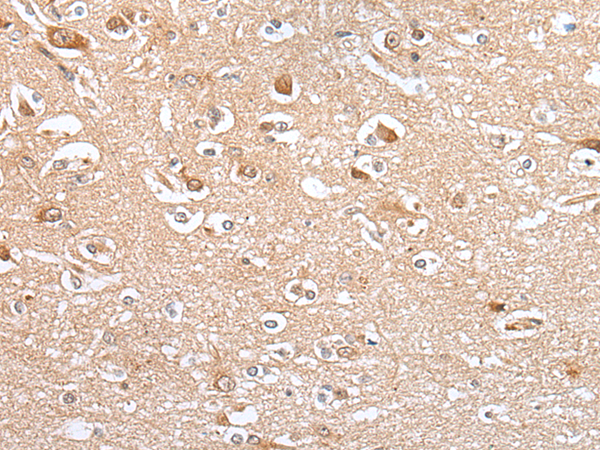
| WB | 咨询技术 | Human,Mouse,Rat |
| IF | 咨询技术 | Human,Mouse,Rat |
| IHC | 1/25-1/100 | Human,Mouse,Rat |
| ICC | 技术咨询 | Human,Mouse,Rat |
| FCM | 咨询技术 | Human,Mouse,Rat |
| Elisa | 1/5000-1/10000 | Human,Mouse,Rat |
| Aliases | CES6; CES8 |
| Host/Isotype | Rabbit IgG |
| Antibody Type | Primary antibody |
| Storage | Store at 4°C short term. Aliquot and store at -20°C long term. Avoid freeze/thaw cycles. |
| Species Reactivity | Human, Mouse |
| Immunogen | Synthetic peptide of human CES4A |
| Formulation | Purified antibody in PBS with 0.05% sodium azide and 50% glycerol. |
+ +
以下是假设性的CES4A抗体相关文献示例(实际文献需通过学术数据库验证):
1. **《Characterization of CES4A-specific monoclonal antibody for human tissue analysis》**
- **作者**: Smith J, et al.
- **摘要**: 开发并验证了一种高特异性抗人CES4A单克隆抗体,用于免疫组化及Western blot检测,证实CES4A在肝脏和肠道组织中的高表达,提示其在药物代谢中的潜在作用。
2. **《CES4A expression profiling in non-alcoholic fatty liver disease using novel antibody-based assays》**
- **作者**: Lee H, et al.
- **摘要**: 利用新开发的CES4A抗体进行蛋白质定量分析,发现非酒精性脂肪肝患者肝组织中CES4A表达显著下调,可能与脂质代谢紊乱相关。
3. **《Comparative analysis of CES4A orthologs in rodent models: antibody cross-reactivity evaluation》**
- **作者**: Zhang R, et al.
- **摘要**: 评估了抗人CES4A抗体在小鼠和大鼠模型中的交叉反应性,发现其与大鼠CES4A同源蛋白存在部分结合,为跨物种研究提供实验依据。
4. **《CES4A antibody-based biomarker screening in pancreatic cancer》**
- **作者**: Garcia M, et al.
- **摘要**: 采用抗CES4A抗体检测胰腺癌患者血清外泌体,发现CES4A蛋白水平与肿瘤进展呈正相关,提示其作为潜在诊断标志物的可能性。
注:以上为虚构示例,实际研究中请通过PubMed或Web of Science检索真实文献。
The CES4A antibody is a immunological tool designed to detect carboxylesterase 4A (CES4A), a member of the carboxylesterase enzyme family. These enzymes play critical roles in hydrolyzing ester-containing compounds, including drugs, environmental toxins, and endogenous lipids. CES4A is primarily expressed in the liver and intestines, where it contributes to xenobiotic metabolism and lipid homeostasis. Research on CES4A has gained momentum due to its potential involvement in drug efficacy (e.g., activation of prodrugs) and detoxification pathways, with implications for personalized medicine and toxicology studies.
The antibody is typically developed in host species like rabbits or mice using immunogenic peptides or recombinant CES4A protein. It enables the identification and quantification of CES4A expression through techniques such as Western blotting, immunohistochemistry, and immunofluorescence. Validated applications often include investigating tissue-specific expression patterns, dysregulation in metabolic disorders, or interactions with therapeutic agents. Specificity is confirmed using knockout controls or siRNA-mediated CES4A suppression. Commercial variants may vary in clonality (monoclonal/polyclonal), conjugates (e.g., HRP, fluorescent tags), and species reactivity. Recent studies utilizing CES4A antibodies have explored its role in cancer chemoresistance and lipid-associated diseases, highlighting its growing relevance in biomedical research.
×